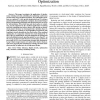10 search results - page 1 / 2 » Methodology to achieve higher tolerance to delay variations ... |
GLVLSI
2010
IEEE
13 years 9 months ago
2010
IEEE
A methodology is proposed for designing robust circuits exhibiting higher tolerance to process and environmental variations. This higher tolerance is achieved by exploiting the in...
ICCAD
2005
IEEE
14 years 1 months ago
2005
IEEE
— Increasingly prominent variational effects impose imminent threat to the progress of VLSI technology. This work explores redundancy, which is a well-known fault tolerance techn...
ACSD
2009
IEEE
13 years 11 months ago
2009
IEEE
Asynchronous and latency-insensitive circuits offer a similar form of elasticity that tolerates variations in the delays of communication resources of a system. This flexibility ...
TCAD
2002
13 years 4 months ago
2002
Abstract--This paper investigates the application of simultaneous retiming and clock scheduling for optimizing synchronous circuits under setup and hold constraints. Two optimizati...
DATE
2003
IEEE
13 years 9 months ago
2003
IEEE
The design of clock distribution networks in synchronous digital systems presents enormous challenges. Controlling the clock signal delay in the presence of various noise sources,...

